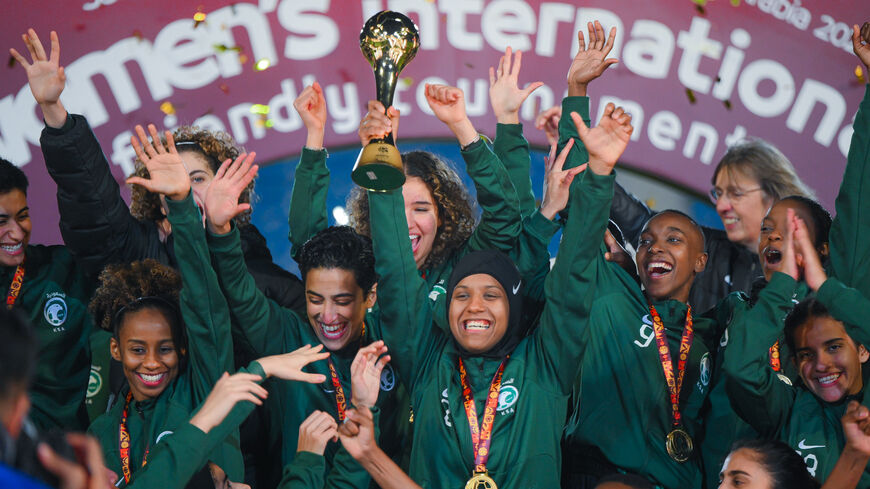A Saudi national women’s team winning a tournament would ideally be front-page news. But a friendly match showcasing contemporary soccer's four greatest male stars in the nation’s capital on the same day almost drowned out the story in Saudi Arabia last month.
Faraway from Riyadh’s King Fahd International Stadium, where Cristiano Ronaldo of the Al Nassr-Al Hilal combined XI and Lionel Messi, Neymar and Kylian Mbappe of visiting Paris Saint-Germain met for the first time on any pitch, Saudi Arabia’s national women's team were crowned champions at the Prince Saud bin Jalawi Stadium in Al-Khobar, a small city some 400 kilometers (248 miles) from the capital. They were competing at the four-nation Women’s International Friendly Tournament alongside soccer teams from Pakistan, Mauritius and Comoros.
Despite the relatively low media coverage and the very low ranking of participating teams, the hosting of the four-nation tournament and Saudi Arabia's participation is a historic event.
Saudi Arabia formed a women's national soccer team less than two years ago and is not ranked among FIFA's 187 nations. Mauritius ranks 187 and Comoros ranks 182, but Pakistan is higher at 160, with few of its players participating in European leagues.
📸| أبطالنا + 🏆 !!#معاً_نصنع_التاريخ 🇸🇦🤍 pic.twitter.com/9UOOAI55PM
— إدارة الكرة النسائية - SAFF (@saff_wfd) January 19, 2023
The stars of the Saudi women's national soccer team are Al Ittihad’s left-back Bayan Sadagah and Al Nassr’s goalkeeper Sarah Khalid co-captain Saudi women’s soccer team. Attacking midfielder Al Bandary Al Mubarak is a top scorer. Another team member Farah Jefry became the first Saudi sportswoman to represent sports goods manufacturer Adidas in 2021, while midfielder Seba Tawfiq was chosen as the best player at the 2022 WAFF Futsal Championship.
The news comes as the Visit Saudi tourism brand reportedly sealed a deal this week with FIFA to become a prominent sponsor of Women’s World Cup to be held in Australia and New Zealand in July. The hosts were blindsided by the announcement and have complained about the sponsorship, given Saudi's history in the game and its restrictions up until 2017 on women prohibiting them from playing and even entering stadiums.
Host Australia and New Zealand football associations lodge complaint with FIFA over Saudi tourism board sponsorship of Women’s World Cup. https://t.co/dsNVCP3kNt
— Kristin Diwan (@kdiwaniya) February 1, 2023
The Saudi women’s team coach is Monika Staab, a UEFA veteran who has worked with female soccer players in around 80 countries and who coached Qatar’s women’s team from 2013-2014, called their victory a milestone.
“Winning this tournament is an important milestone in Saudi Arabian soccer and will give the players huge confidence as they progress their national team careers. … It provides a huge springboard for future success and inspiration for young girls across every corner of Saudi Arabia as well as the other talented young players in the [Saudi Women’s] Premier League who aspire to play international soccer," Staab said.
The win is an added boost coming just as Saudi Arabia has confirmed its bid to host the 2026 AFC Women’s Asian Cup.
Saudi Arabian Football Federation (SAFF) representative told Al-Monitor that the team will make it to FIFA's official rankings. “They will feature in FIFA’s next official rankings list for the very first time, enabling them to participate formally in regional and continental qualifiers and competitions," the representative said.
FIFA chose last month Anoud al-Asmari as an international referee, making her the first female referee from the kingdom.
#SaudiArabia #Iraq : First woman to referee football matches in Gulf Cup - Anoud al-Asmari is first Saudi woman to receive #Fifa international badge #عنود_الأسمري #كاس_الخليج #خليجي25 pic.twitter.com/uYnSc23E8h
— sebastian usher (@sebusher) January 7, 2023
When Qatar was chosen in 2010 to host the 2022 men’s World Cup, FIFA’s bid evaluation report cited Qatar’s commitment to the “promotion of women’s soccer, including the creation of special facilities.” However, having a women’s national team is not a requirement to host the men’s World Cup.
“Green Ladies Saudi Arabia. From the beginning, the motto was #TogetherWeCreateHistory. Today the first line of that history has been written in the kingdom. Congratulations on winning the championship and entering the international ranking,” Saudi Sports Minister Prince Abdulaziz bin Turki Al-Faisal tweeted.
Women’s sports teams worldwide fight the discriminatory policies of different establishments. In the United Kingdom, soccer was off limits to women until the early 1970s due to a 1921 Football Association edict banning women's soccer. Almost two years ago, England’s women traveled premium economy to the SheBelieves Cup in America, while the senior men’s team travels in business or first class. In 2014, a group of US women’s players sued FIFA over the artificial turf they were forced to play on.
But the situation was worse in Saudi Arabia, where powerful conservatives long prevented women from participating in sports. When two Saudi women, 800-meter runner Sarah Attar and judoist Wodjan Ali Seraj Abdulrahim Shahrkhani, participated in the 2012 Summer Olympics in London thanks to persuasion from the International Olympic Committee and a rights campaign that began in 2009, Saudi Twitter was flooded with a hashtag that translated as “Olympic_Whores.”
Initially, the International Judo Federation also made things difficult for Shahrkhani, saying she would have to fight without a hijab, said The National News. However, oddly enough many Saudis were largely protective of the swimmer Jasmine Alkhaldi, who is half Saudi, in her Olympic participation in representing the Philippines.
The immediate reason for setting up a national team for women’s soccer is attributed to the kingdom’s increased sports push as part of Saudi Vision 2030. Still, one can’t deny the role of a few early sports organizers such as Lina Khaled Almaeena, chairperson of the basketball club Jeddah United.
Speaking to Al-Monitor, Almaeena said it’s a beautiful evolution to see sports emerging as an outcome of Vision 2030, as a sector and as a means of women’s empowerment.
“As someone who created an industry under a commercial umbrella when there were no laws, legislation [or] governance for women’s sports 20 years ago, and as someone who voted as a Shura member for [physical education] in the country’s government schools while sitting on the Consultative Council, seeing these developments are miraculous as it also involved the ‘social change of the mind,’ as HRH Ambassador Reema bint Bandar described it,” Almaeena said, referring to a recent speech by the Saudi ambassador to the United States, who previously promoted women’s sports in her various roles in sports administration.
Unlike those who went to public schools, Almaeena had opportunities to practice basketball at her private school. In 2003, she gathered her old schoolmates over the idea of forming a basketball team in Jeddah, which now is a private club with franchises in other cities and whose members represent Saudi Arabia in regional tournaments and who won gold in the Saudi Games last November.
World Cup host Qatar, who halted play for its women’s teams in 2014 for unknown reasons, is also reviving it, perhaps because of competition in the neighborhood.
Al-Asmari, Staab, Bandar and many others who work in soccer and other sports contacted individually and through the Saudi Arabian Football Federation didn’t respond to Al-Monitor’s emails and text messages. A public relations firm handling the Federation's communications said replies “might be difficult considering the short notice and the ongoing international friendly tournament in Dammam.”








